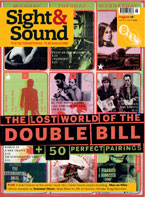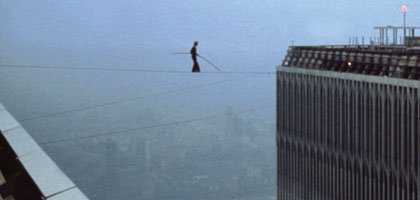
Man on Wire
UK 2007

Reviewed by Catherine Wheatley
Synopsis
Our synopses give away the plot in full, including surprise twists.
A documentary about Frenchman Philippe Petit's high-wire walk between the twin towers of New York's World Trade Center on 7 August 1974. Mixing archive footage, dramatic reconstructions and interviews, the film recounts the planning and execution of the stunt and the consequences for the people involved.
In 1968 the 18-year-old Petit read an article about the planned construction of the World Trade Center and decided that he would one day walk between its towers. While awaiting their completion, he performed two high-profile wire walks - one between the spires of Paris' Notre Dame Cathedral and the other over Sydney Harbour Bridge. In both instances he was aided by childhood friend Jean-Louis Blondeau.
In January 1974, Petit visited New York and enlisted a team of hippies and petty criminals to help him break into the WTC and stage his 'coup'. Over the following seven months he moved between New York, where he conducted reconnaissance on the building, and rural France, where he practised the walk. Despite numerous setbacks and last-minute hitches, Petit and his accomplices infiltrated the WTC and carried out the stunt: to the delight of the crowds below, Philippe spent 45 minutes dancing on the wire before being arrested for 'criminal trespass and disorderly conduct'.
On his release from prison, Philippe was an international celebrity. His friends, however, were deported. Their relationships broke down in the wake of the wire walk, but they nonetheless treasure the memories of it.
Review
James Marsh is known to British audiences for fashioning elegiac works from archive film (Wisconsin Death Trip) and interviews (The Burger and The King) alike; more recently he has demonstrated a gift for crafting a tautly-strung thriller with his 2005 fictional turn The King. These elements resolve in his enthralling new documentary Man on Wire, a film that will surely elicit gasps of wonder from its audiences as it recounts the story behind Frenchman Philippe Petit's high-wire walk between the twin towers of New York's World Trade Center on 7 August 1974. Marsh's film is as giddy and constantly breathtaking as the story it tells. Footage of the 23-year-old Petit practising for the walk in rural France shows us a sun-dappled idyll of youth at leisure, while dramatized sequences play out like a heist movie: in atmospheric monochrome, the motley crew of petty criminals and hippies that Petit put together inveigle their way into the towers, dodging security guards as they hasten to set up the stunt before dawn breaks.
Marsh does well to maintain suspense here. As in Kevin MacDonald's Touching the Void, the interweaving of reconstructed sequences with present-day interviews with those involved means that we know it will come off in the end. And yet the tension builds incrementally, reaching almost unbearable heights at its dizzying climax. Where MacDonald found dramatic irony in juxtaposing the quintessentially British reserve of his two climber-protaganists with the sheer scale of their story, Marsh on the other hand has found in Petit a Gallic raconteur entirely enamoured of his own self-mythology. The puggish Frenchman bears a striking resemblance to the young Malcolm McDowell, and occasional flashes of that actor's demonic screen persona illuminate his narration. He's possibly a sociopath, certainly an egomaniac; a man who, having scaled Sydney Harbour Bridge and brought the city's traffic to a standstill, would steal the watch off an arresting officer just because he could.
For some, such as childhood friend Jean-Louis Blondeau (the Sancho Panza of the piece) and then-girlfriend Annie Allix, who proclaims herself "overwhelmed, bowled-over, harpooned"by the young pretender, Petit's self-belief was irresistible. Both are tossed aside like so much old rope after the coup, yet their teary-eyed accounts of the time they spent in Petit's orbit are filled with admiration. Others were simply along for the ride: the outrageous cast of former cohorts also includes moustachioed N. Barry Greenhouse, 'the inside man', burly Jim Moore, 'the fixer', and the hilarious David 'Donald' Foreman, whose glib response to Jean-Louis' suggestion that he may have been high on the night of the event is, "I smoked pot every day for 35 years - no reason to think I wasn't stoned that night."
Foreman's comment typifies the film's nervous humour - outrageously funny precisely because the audience is aware of the potentially horrific consequences of any error on the team's part. It's also a reminder that Petit's stunt took place in 1970s America, a backdrop vividly conjured by Marsh. Fleetwood Mac and Walter Murphy and the Sunshine Band play over archive footage of New York streets and Richard Nixon defending himself on the news. "I have never obstructed justice,"mumbles Nixon, a defence that sounds remarkably similar to Jean-Louis' claim that the high-wire walk was "illegal, but not wicked or mean". Despite the fact that Petit's walk took place the week the Watergate story broke, it's a nostalgic evocation - indeed, that Petit and crew are able to penetrate the towers so easily is evidence of a more innocent age, in which shock and awe, the words repeatedly used in connection with Petit's act, were not yet burdened with martial overtones.
Of course, the spectre of 9/11 looms large - how could it not? But it is to Marsh's credit that he never hammers the point home. It's enough to let it hover in the air, just like the jet caught passing overhead in the stunning climactic sequence of stills of Petit balanced on the wire. Or Petit himself - who, with the wire barely visible from street level, takes on an uncanny resemblance to the now infamous 'falling man'. For contemporary audiences, Petit's moment of mastery is inevitably shot through with a sense of loss; the following scenes, which reveal the band's subsequent dissolution, reaffirm the bittersweet truth that triumph is but fleeting. The film's vision, though, is ultimately uplifting: relationships, like buildings, can collapse into rubble, but as Annie tenderly puts it, sometimes "It is beautiful that way."
Credits
- Directed by
- James Marsh
- Produced by
- Simon Chinn
- Based on
- the book To Reach the Clouds by Philippe Petit
- Director of Photography
- Igor Martinovic
- Film Editor
- Jinx Godfrey
- Music
- Michael Nyman
